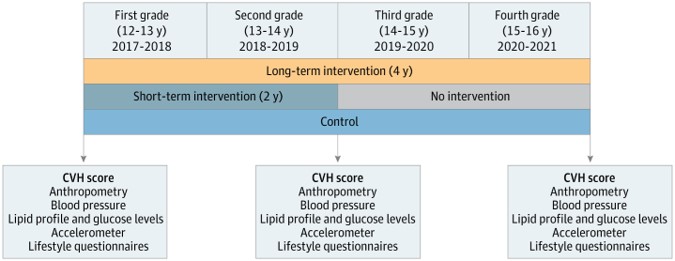Jama Cardiology: Promoting health in high-school students: a randomized group intervention trial
JAMA Cardiology has published the final results of a health-promotion intervention designed and carried out by the SHE Foundation, the Centro Nacional de Investigaciones Cardiovasculares, and the University of Barcelona involving the participation of 1326 adolescents from 24 state secondary schools in Madrid and Barcelona.
The results show a beneficial impact that depended to a large extent on the intensity of the educational intervention. Unfortunately, the beneficial impact was not sustained over time.
The SI! (Salud Integral) Program for the promotion of cardiovascular health in the school environment is an educational intervention designed by the SHE Foundation with support from Fundación “la Caixa” and is directed by CNIC Director Dr. Valentín Fuster. The program covers the preschool, primary, and secondary educational stages and includes girls and boys between the ages of 3 and 16 years. Since 2009, the SI! Program has been assessed in randomized intervention trials in 3 countries with differing socioeconomic contexts: Colombia, Spain, and the USA. These studies have included a total of approximately 7000 boys and girls.
The program covers 4 fundamental and interrelated components: diet, physical activity, knowledge of the body and heart, and emotions management. Content and strategy are adapted to each age group and include the whole educational community of students, teachers, and families and also consider the school environment.
The new study reports the results of a school-based health-promotion intervention in more than 1000 adolescents between the ages of 12 and 16 years. The main goal was to assess the impact on lifestyle and health parameters of 2 versions of the SI! Program secondary school intervention that differed in their duration and intensity.
The 24 participating high schools were randomized to intervention group (SI! Program intervention during the first 2 years of high school or throughout the 4-year secondary education period) or to a control group that continued with the schools’ usual study plans.
To assess the cardiovascular health of the participating adolescents before, during, and after the intervention, the study used the cardiovascular health metric recommended by the American Heart Association. This metric covers lifestyle habits and health parameters such as body weight, diet, physical activity, smoking, blood pressure, and blood cholesterol and glucose concentrations.
The longer version of the SI! Program for Secondary Schools intervention showed a significant improvement in the cardiovascular health of adolescents when assessed at the midway point. In contrast, the more intensive 2-year intervention produced no significant effects.
The second phase of the 4-year intervention was affected by the Covid-19 pandemic, and the results of the final evaluation therefore need to be interpreted with caution.
Although health promotion initiatives have become increasingly routine in the school environment in recent years, very few have addressed overall cardiovascular health, and it is therefore important to continue to improve school-based interventions in order to define the most effective strategies.
The study was supported by Fundación SHE-Fundación la Caixa, the Instituto de Salud Carlos III (ISCIIII), and Fundació La Marató de TV3.











